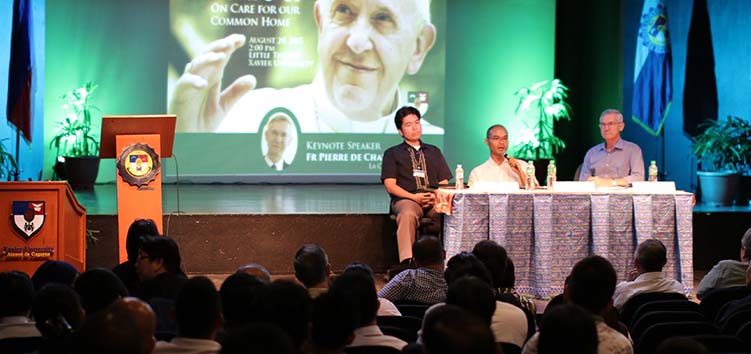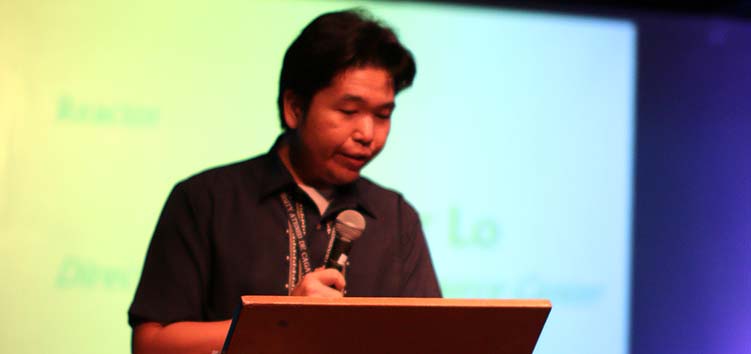
By Engr Dexter S Lo
[This was delivered during the Laudato Sí symposium on August 20 at the XU Little Theater.]
Good afternoon, everyone!
Honestly, I find it very challenging to share my limited knowledge in and experience with disasters, climate and spirituality, in front of experts in both science and faith. But I will brave this discourse because I believe there is grace in telling a simple story from a humble and honest heart.
Foremost, thank you, Fr Pierre [de Charentenay SJ] — for the brilliant, comprehensive and deep presentation of Laudato Sí. Thank you also, Fr Rey [Raluto] — for beautifully discussing essential points which I could have never fathomed.
Now, I’d like to share my reflections in three aspects:
First, as a scientist.
I am very honored and grateful that the document starts with a chapter on facts. After all, as scientists, our mission is also to discover the truth.
I am amazed at how the document quickly yet clearly outlined the most pressing parameters that truly matter in understanding and healing our wounded home. These are the very items natural and social scientists use to measure and assess the planet’s sustainability.
Fr Pierre outlined them in seven items, which are shared in the global battle for the environment. And I wish to emphasize further that these are also present locally – in our midst, in our city, in our neighborhood.
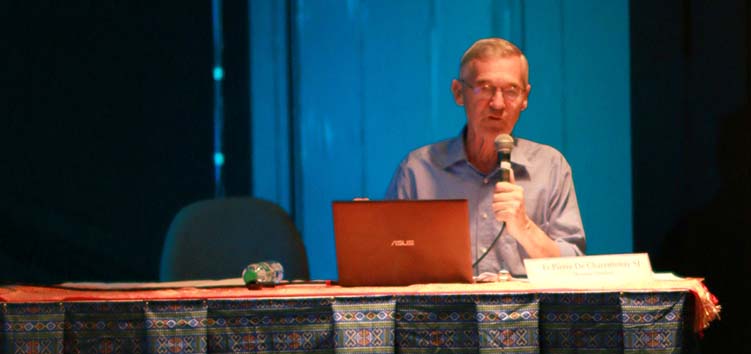
For example, in the case of Bitan-ag Creek, which my students and other XU units are currently studying:
(1) Pollution and Climate Change
Clearly there is something seriously wrong with the solid waste generation and handling in the area. After doing fieldwork there, I struggled with the disturbing paradox that it is much harder to understand the “why?” when the answers are already very clear (at least from a scientific perspective). When heavy – sometimes heavier than usual (the new climate?) – rains bring flood, we tolerate it because to face the science and the truth of our actions is much more difficult and painful. This is not only unfortunate, it is heartbreaking!
(2) Water
Fr Pierre mentioned about rivers and I happen to have been working with those. I always like to think that our rivers and creeks are the bloodstreams of Mother Earth. We only need to see the water around us (either plainly or through a microscope) and the truth is unveiled. Technically, the water is dirty, unsafe, and maybe even toxic. Morally, it is harder to embrace, and most often just easier to run away from!
(3) Biodiversity
It’s not just about the physical world of hydrology and geology. Along our rivers and creeks are living beings of different forms and beauty. I’ve had the chance to work with biologists, chemists, physicists and indigenous peoples, and their discoveries taught me humility because there are so many lessons to learn from the width of fallen leaves, the migration of fishes, and the chirping of birds that predict the coming of a storm.
(4) Quality of Human Life and (5) Inequality, the Poor (and the Vulnerable)
Back in Bitan-ag, you only need to traverse the creek and discover the “urban caves” of informal settlers (hundreds of them). I am not a social scientist, but clearly human dignity is not only challenged but broken in the area that is just few blocks away from where we are now. And consistent with what Fr Pierre said, disaster science affirms that “it is the poor who are most vulnerable to the damaging impacts of a changing climate.”
(6) Weak Responses and (7) Variety of Opinions
I have to admit that handling political structures is not my expertise. But working on DRRM-CCA (Disaster Risk Reduction and Management – Climate Change Adaptation) taught me that scientists cannot just remain in our laboratories. I have learned that science can be more powerful and useful if we use it further as platform for sincere dialogues dedicated to implementing actions (however local or small). But of course this path is not easy (and not too comfortable) for many scientists like me. It needs deeper motivation and lasting commitment — which I believe (at least for me) is anchored on my Christian faith.
In grade school science, we learned that matter exists as solid, liquid or gas, and that it can change from one form to another. Science is very clear on this “connectivity” and this afternoon, Fr Pierre beautifully reminded us that this connectivity of creation also includes us and God. Clearly, this affirms that the mission of a (Christian) scientist is not only to search for truth (the what?), but essentially its meaning and purpose as well (the why?).
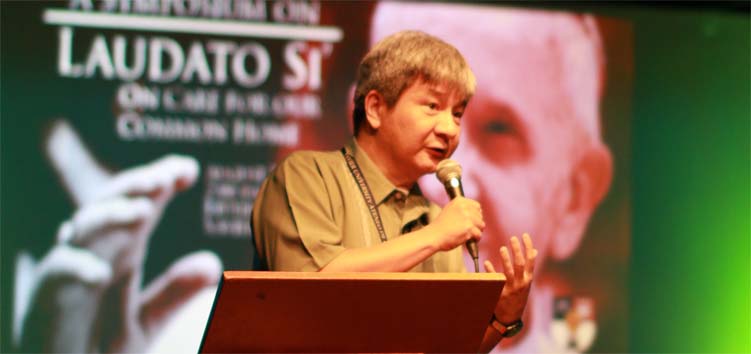
Second, as an engineer.
There is a joke that scientists discover knowledge, but it’s the engineers who make solutions!
It is true that as engineers, we are trained to master efficiency, productivity and speed; that we develop solutions to many of the world’s problems. And I will not waiver on that.
But Fr Pierre kindly reminded us that most often, the world’s problems are not in (or at least not limited to) the technical sphere alone. There are also the social, ethical and spiritual dimensions which we need to live by and uphold. These dimensions should not be dichotomized, but instead treated as “complex” interrelated realities, of which we are part.
Actually, we have something similar in engineering. We study what is called “systems dynamics” — which is an approach to understanding the non-linear behavior of complex systems over time, considering flow directions, feedback, loops (as usually the case), and to “predict” sustainability or collapse and disintegration of a system.
So what Fr Pierre shared to us is precisely consistent with how engineers “should” analyze solutions and design technologies. Truly, we need to be reminded (as least once in a while) that we are part of the system we are trying to solve. We are not some distinct beings and the world is not merely an object of experimentation (even with the noblest intentions).
And what if we fail to completely solve the problem? There will be peace in our hearts because we have respected others along the process. There will be peace in our hearts because we have not lost our humanity along the journey.
In that beautiful prayer, I will echo:
We lay foundations that will need further development.
We cannot do everything, and there is a sense of liberation in realizing that.
This enables us to do something, and to do it very well.
It may be incomplete, but it is a beginning, a step along the way, an opportunity for the Lord's grace to enter and do the rest.
We may never see the end results, but that is the difference between the master builder and the worker.
We are workers, not master builders.
And humbly I quote from the document: “Any technical solution which science claims to offer will be powerless to solve the serious problems of our world if humanity losses its compass...” (Par 200, P 147)
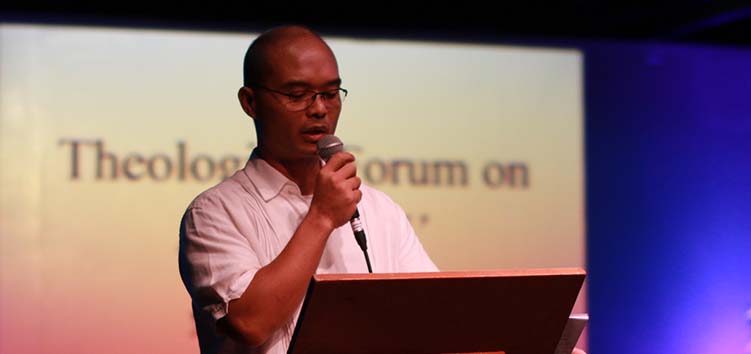
And finally, as a Christian.
I am guilty. I have sinned against creation, against others, and against God.
And I am wounded, but I am willing to change.
If I will momentarily forget about science and engineering, and just focus on being a human person, reading this document and listening to Fr Pierre give me hope. Fr Pierre mentioned about gratitude and reconciliation. Two very powerful virtues a sinner like me badly needs.
We are taught that if there is a way to sustain our commitment to this battle, it is because we are grateful that we are part of this beautiful masterpiece called creation. How can we destroy a gift entrusted to us? We can and should only be grateful that we are given a chance to take part in the harvest, and in ensuring that this gift is also cherished by future generations (Fr Pierre pointed out “justice between generations”).
We are also taught that even if we have sinned, it is not the end. The Jesuits published a document called “Reconciliation with Creation” (“referred” in Laudato Sí). It calls us to face the facts, and have the humility to admit that we have sinned. And now, we need to do our penance, to walk our talk, and make our commitments a lifestyle.
Once in a while, my former students would call (or “PM” me on Facebook) and tell stories of successes and achievements, but also of challenges and struggles because they are now working in industries related to mining, coal-powered plants, or massive infrastructures that replace the natural landscape.
Oftentimes our conversations lead to questions of ethics, morality and faith. I cannot offer outright solutions, but now this document offers some light when our soul finds it too dark to bear the realities of the world — that there is hope if we start to sincerely reconcile.
Finally, we are taught that it takes deep love to embrace a sinner — like me. All these destructions are but brokenness of which only love can heal.
As a final note, I quote: “The emptier a person’s heart is, the more he or she needs to buy, own and consume…” (Par 204, P 150)
But this afternoon, Fr Pierre and Fr Rey filled our hearts with wisdom and love. And my prayer is that we joyfully realize that beautiful prayer of St Teresa of Avila, indeed: “God alone, suffices.”
Thank you, Fr Pierre. Thank you, everyone!
***
Engr Dexter Lo is the founding director of Xavier University’s Engineering Resource Center. He is actively engaged in disaster risk reduction and management work with his students. He is also a poet on Facebook.
[Open forum follows the talks, reflecting on the challenges of reconciling with creation and the Pope’s exhortations to generously care for our common home.]
